#potc meta
Explore tagged Tumblr posts
Text
So I was thinking about pirates of the Caribbean, and each characters unique moral code and way of approaching life, as one does, when I remembered a particular scene about our beloved James Norrington... the very first scene in which Jack and James meet. Now, as a long time Sparrington shipper, I adore the Sparrington fandoms adopted head canon of Jack's compass pointing directly at Jack when James is holding it as having a romantic connotation too it, but this is Disney we're talking about, and a Disney from 20 years ago at that, so it is of course just a head canon. And while it is a beloved head canon, I will always be a writer before a shipper, and what that scene says about Norrington from a writer's perspective is far too juicy not to share... So buckle up for a very long meta post about who James Norrington is as a person, and how it was set up in this scene(and later reinforced in the second and third movie). This is my first real meta post, and I'm very excited for it, so let's jump right in.
First of all, the compass scene.
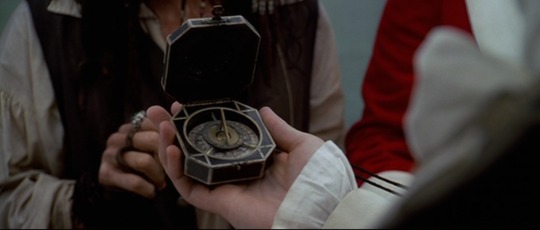
As we can clearly see in the image above, since the red line that points to the object of the holder's desires is no where to be seen, its relatively easy to conclude that it's hidden from our view by the sun dial in the middle, and thusly is pointing directly at Jack. Elizabeth is off to James's right, and no one is standing behind Jack, so unless the compass was pointing at something in the far off distance that just so happened to be in Jack's general direction(unlikely) its pretty clear what(or who) the compass is pointing at. For most potc fans, this is fairly standard knowledge. But it's what this fact says about Norrington's character that I'd like to focus on. After all, what does it say about a man that a compass that shows you what you desire most is pointing at a pirate, and the very face of piracy at that, instead of your canonical love interest, when you're a Commodore of the Navy? As stated above, Sparrington shippers often point at this scene as proof that James has a bit of a pash on the ruggedly handsome pirate, or at the very least, a thing for men. But from a writer's perspective, this just simply isn't the case, and not because the writer's in this instance are the notoriously homophobic corporation we call Disney. The reason why this is so unlikely from a writing perspective is because given the context clues, we as an audience are meant to draw the conclusion that this is the first time that they meet(I have heard rumors of them meeting as children in the books, but having never read them, and focusing only on the movies, I'm not including that in this post). And since this is the first time they've met, it's highly unlikely that the compass is pointing at Jack because James has a bit of a thing for him. Even if James has heard of Jack's many exploits, he does not truly know the man behind the legend, so having romantic feelings for the pirate at this point in time just isn't believable. And even if James was a closeted gay/bi man, it's still unlikely that the compass would be pointing at Jack of all the men around the Commodore(of which there is a lot, some of whom he is incredibly close with) seeing as Jack is the poster boy of piracy, and at this point in the movie it's made abundantly clear that James vehemently detests the notion and all who practice it. If James were to be holding the compass in Jack's vicinity in later movies and it still pointed at the pirate, an argument could definitely be made that it was because he had developed feelings for Jack, but for their first meeting, it's just not realistic. So it's much more likely that the reason the compass is pointing at Jack is because of James's desire to send every pirate he meets to "a quick drop and a sudden stop" as he so eloquently put it to a young Elizabeth. This is further reinforced in the third movie when it is revealed that Beckett's desire to have Jack dead at his feet would prevent him from using the compass to find Shipwreck Cove if the pirate was not already at the aforementioned location, or, well, dead. This is again, relatively common knowledge. But like I said before, it's what this fact says about James that is the whole point of this post... and that is that James cares more about his career than anything else, even the woman he claims to love. Now for some, that statement alone might seem like a pretty obvious conclusion, but it's how this scene subtlety sets up this core aspect of Norrington's character before we even truly get to know who he is, and how it's brought to it's full height in the second movie, and the core aspect of his redemption and subsequent death in the third that I'd really like to talk about. Which brings us to the next segment of this post...
How James lost his commission to the navy...
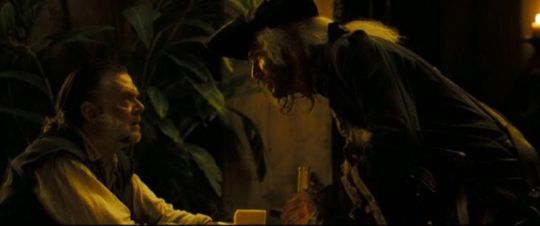
And how he got it back
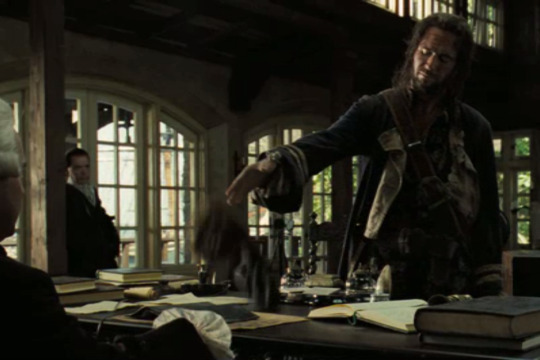
So let's start off with how James lost his commission... it's a story we all know pretty well, and one he tells to Gibbs in the scene shown above, when he plans to either join Jack's crew or get revenge on the man that(he believes) ruined his life. After Jack's escape in the first movie, James grew obsessed with capturing the pirate, so much so that he foolishly followed the Black Pearl into a hurricane, resulting in the sinking of the Dauntless, and the loss of countless lives that had been aboard the vessel. It's unclear aside from James himself who had been on the ship at the time, and who did or did not survive, but the death toll was heavy, with most, if not everyone who wasn't James, having perished in the storm. While it is not the most extreme example(which we'll get too in just a bit), this is a pretty clear example of James prioritizing his career above everything else, even reason and logic. And all just to capture a singular pirate, even at the cost of his own ship and crew, and rather ironically, the very career that he had been so desperately trying to hold onto in the first place. Which brings us to the next scene I'd like to discuss... James stealing the heart of Davy Jones. This moment is the absolute peak of this part of James's character. This is the moment where James takes his obsessive need for his career to the max. This is the moment where James truly prioritizes his career above everything else, even the woman he claims to love(and for Sparrington shippers, above the man he's reluctantly come to care about). At this point in time, when James decides to take the heart for himself to regain his old station, he's been on the Black Pearl long enough to know the full situation. That Jack is in some kind of trouble with Davy Jones, and that if Jack doesn't use the heart to bargain for his freedom, then the Kraken will hunt Jack, and subsequently the Black Pearl, down until he and everyone aboard are dead. And that includes Elizabeth. And yet, despite knowing that stealing the heart would basically mean sealing Elizabeth's death, he still decided to do so. Sure, the argument could be made that he thought Elizabeth would be able to escape somehow, but the chances of her dying at sea, or some other terrible fate befalling her before she could safely make it back to civilization would have been highly likely. Of course we as an audience know that this isn't the case, but James does not. So essentially, James was so obsessed with his career, and maintaining the image of the honorable Commodore that he didn't even truly register that he was putting Elizabeth, the woman he loves and has been trying so desperately to woo for the past two movies, in danger. And he won't fully realize the consequences of his actions until the third movie, in a deleted scene no less(I swear when I find whoever decided to delete some of the most important scenes to James's character...), when Davy Jones informs Governor Swann of his daughters untimely demise on the Black Pearl. Of course, almost immediately afterwards, Beckett retcons that statement by informing the Governor that Elizabeth was recently seen in Singapore, but for a few minutes, James has to sit with the fact that Elizabeth was dead, and it was his fault. And even after learning that she was in fact still alive, James has now finally come to the realization that if she had still been on the Black Pearl when it sank with its Captain, he would've been the one to send her to her death. And for Sparrington shippers, James has to sit with the unavoidable fact that he was the reason Jack had died(even if the pirate does come back), despite the fact that it was Elizabeth's betrayal that was the final nail in Jack's coffin, since she wouldn't have had to do that if the Kraken wasn't after them in the first place. Which brings us to the final scene I'd like to discuss...
James choosing a side, and paying the price

Now, before we fully delve into this scene, I'd like to take a moment to talk about James's own perception of himself, and his relationship with honor and integrity. From the very first scene in which we meet James Norrington, we are made aware that he has a strong moral compass. He firmly believes piracy is evil, and that all who partake in piracy deserve a swift end. He perceives his Commodore persona as being the paragon of honor and integrity, and the sole arbiter of justice. We can infer from the line "By remembering that I serve others, Sparrow, not just myself" that James does have honorable intentions when ridding the world of pirates, that being protecting the innocent citizens under his care, but as seen once again in the first time James and Jack meet, wherein James adamantly tries to arrest Jack despite the fact the fact that pirate had just saved Elizabeth's life, his actions to achieve that goal are not always quite as honorable as his intentions are. This is especially highlighted once again when James gave Beckett the heart of Davy Jones. James's intentions here were once again rooted in honor and integrity - he believes that the only way to keep people safe from pirates is too return to his old station, to the image of honor and integrity he had built around the title of Commodore, and the only way to return to his old station is to give Beckett the heart. But the action itself was far from honorable, seeing as James had to betray the woman he loved just to obtain the heart, and that he was now putting it into the hands of a dangerously unstable individual who planned on using it to commit mass genocide.
And now, we finally get to the scene above... Of course, it's made clear throughout his scenes in the third movie leading up to this one that James is already starting to regret giving Beckett the heart after seeing the damage being caused, but since Beckett is targeting pirates specifically(although we as an audience know that Beckett's definition of pirate is very loose) James figures that the ends justify the means, as he often does in situations regarding piracy. It is not until his reunion with Elizabeth, where he learns that Governor Swann is dead, and that Beckett lied to him about the Governor's whereabouts, that James truly realizes the enormity of his mistake. It is in this moment that James has a sudden realization that fundamentally shakes him to his core, and is the reason behind his change of heart later on. He realizes that the honorable Commodore persona that he had tried to cultivate and keep a hold of for so long had never been truly honorable at all, and that by giving Beckett the heart of Davy Jones, he had effectively tied the noose around the neck of his own honor and integrity, as well as the necks of hundreds, if not thousands of innocent people, with his own hands. And as that one vine goes, this was the moment James knew, he fucked up. Which leads to his decision to change sides in an attempt to redeem himself, and his subsequent death in the process. Of course, part of James's reason for helping Elizabeth escape was that he does care for her, but given everything I've detailed about him so far, I think it's safe to say the main reason that James decided to help Elizabeth and her crew was because he wanted to undo the damage he had done, and he had faith that Elizabeth, Will, and Jack would have some sort of plan to defeat Beckett, and stop any further damage to come from his mistake. And now, for his death scene itself... As much as I love the idea of James surviving and joining the pirates(whether at Elizabeth's side or Jack's is unimportant), I firmly believe that his death was a necessary end of this part of his character arc, and that if he were to survive he would still have to go through a major ego death for this part of his character arc to end properly. Because as Bill turner drives that wooden pike into James's gut, it's not just the physical death of his body, but also the metaphorical death of Admiral James Norrington, and the ideals that James had used to build the persona out of. So even if James survived, the Admiral would still have to meet his metaphorical end, thusly causing James to lose a core part of himself that had been guiding most his decisions so far, in the process, which would start the next part of his character arc, where he would have to deal with the loss of a key part of his personality, and rebuild himself from the ground up to finally, truly become the image of honor and integrity he had envisioned from the beginning.
And that concludes this very long post. I could probably wax enough poetics about this aspect of James's character to write a short novel, but I've said everything important to this post, and if I go on any longer, I'm likely to start repeating myself lol. Thank you for reading, and feel free to share your thoughts in the comments or a reblog! I will always love hearing more about our polished peacock <3
#pirates of the caribbean#james norrington#jack sparrow#elizabeth swann#cutler beckett#davy jones#sparrington#norribeth#meta#potc meta#a character study of james norrington
324 notes
·
View notes
Note
How do you think Davy Jones and Calypso met? What do you think about their relationship ?
HWOAGGHH okay so let's get right into it
Supplemental POTC sources talk about Davy Jones basically being this incredibly skilled sailor likely from wealth and means who was able to impress Calypso and gain her favor through his seafaring abilities
It's a cool origin story and I've played around with it in fic, but I've always wondered what SPECIFICALLY about him caught her eye, because he wasn't the only great sailor of his time---like, he'd have to have done something absolutely bonkers in order for the goddess of the sea to take notice
I love hearing headcanons about this, but the flavor of origin story I've ascribed to him in most of my fics is "humble beginnings" / tragic war history / desertion / escape to sea
In my stories, what Davy Jones brings to seafaring and captaining his own ship that is interesting to Calypso is both a humility about his place in life and an obsessive devotion to the sea as the one thing worth living for / keeping him alive
He's not in it for profit, he's in it for survival and ends up aiding others---I have the Flying Dutchman (visually of Dutch design, 16th century, built like a slave trading ship) taken from Dutch slave traders at the height of their operations and the captives freed, both as a practicality on Jones' end (incredibly useful type of ship that balances speed and firepower) but more importantly as a compassionate act. There has to be a reason why Calypso chose him for the most compassionate role in the world, the most essential job in easing the dead into the next life.
I don't think that it's a coincidence that Calypso appears in the mortal form that she does, I think that witnessing men's greed as the soul of the sea has made her particularly sympathetic to the atrocities of the stealing and transport of West Africans to other parts of the world, countless of whom drowned and chose to throw themselves into the sea rather than face a life of subjugation. THIS resonates with her, this makes sense to her, her entire story is about having her freedom taken from her, and for that I deeply appreciate the casting and characterization choices they went with canonically, because it lends itself to such rich meta analysis. A lot of fan characterizations of Calypso paint her as completely discompassionate, uninvolved, and uncaring about the world of men, but I do not agree with this, I see her interest in humanity being much more complex, with hate, reverence, love, and disdain all mingled together
And that's ultimately why Jones stands out to her first, because he is one of the few/only people at sea not for profit, his freedom is wrapped up in the sea, and he has enough of a broken past that makes any kind of devotion he displays deeply and overwhelmingly all-or-nothing
It's this that lends itself to the imbalance of power and lack of compromise between them, which then leads to the betrayal, etc etc. But they are at the core of their relationship the two people who understand each other more than anyone else in the world could, but they are still mired in misunderstandings because they are a human and a god, because those relationships are doomed by nature of what they are, because you can never fully understand someone whose concepts of time, devotion, and reality are so fundamentally different to your own.
I love thinking about how terrible they are for each other and how no one else in the world fits better together than them. Their story is the most pivotal and interesting piece of lore to the trilogy, and ultimately the reason why I think P4 and P5 fell flat---because the writers kept scrabbling for something mystical and fantastical to try and replicate this, but nothing came anywhere close to reproducing that same love and meaning of the Jones/Calypso Elizabeth/Will contrast. Which I could also go on and on about but I'll stop here!
78 notes
·
View notes
Text
Will Turner Is Not Smart: Dead Man’s Chest Edition
It’s time to dive into the second Pirates film, in which Will Turner suffers the consequences of his own actions, yet stubbornly insists on repeating the same mistakes. Previous take on Will’s unhinged decision making in Curse of the Black Pearl is here.
Prologue: Rescuing Jack in the most dramatic way possible
This was #5 on the list of Will’s unhinged decisions in Curse of the Black Pearl, and it bears repeating here because it is the inciting incident for literally everything that comes next. Will and Elizabeth would not have been dragged into the nonsense with Davy Jones or anything else that happens in the second and third movies had they not publicly saved Jack Sparrow in front dozens, if not hundreds, of witnesses.
Clownery the First: The ‘deal’ with Beckett
After Will and Elizabeth are arrested, Beckett has Will brought to his office, where he tells Will the following things: 1) The East India Trading Company wants him to recover Jack Sparrow’s compass. 2) In return for the compass, Jack is to receive letters of marque, meaning a full pardon and employment as a privateer for England.
Beckett also mentions in this conversation that Will and Elizabeth “face the hangman’s noose,” but notably he never states outright that he intends to free or pardon Will or Elizabeth. He tells Will to “Bring back that compass or there’s no deal.” But what exactly is the deal? It is implied that Will and Elizabeth can go free, but Beckett never explicitly says it. This is the sort of deal you want in writing, Will. And if not, then at the very least stated aloud, and preferably in the presence of witnesses.
Will got a pass on the clumsy wording of his bargain with Barbossa in the last movie, but apparently he learned nothing from the way that backfired. There is absolutely no excuse for his lack of due diligence here. Clownery.
Clownery the Second: Serving himself up on a plate
I hate the whole sequence on the cannibal island, so I won’t go too far into it, but if someone tells you that they eat “long pork,” run hard in the other direction. The guy who takes Will there won’t even get close to shore, and even if you don’t speak French, the word “dangereux” is pretty self-explanatory. And then, when Will runs into Cotton’s parrot, who says “Don’t eat me!”, he moronically assures the parrot that he’s not going to eat it. Have you forgotten how parrots work, Will? They repeat phrases they have heard humans say. Clownery.
Clownery the Third: Playing Jack’s puppet
In the last movie, Will didn’t trust Jack enough and knocked him out with an oar for… some reason. In this movie, by contrast, you can do anything to Will Turner. He’s shiny and dumb and easy to trick.
First of all, when Will tells Jack that they need to return to Port Royal and trade the compass for Elizabeth’s freedom, he fails to specify: 1) to whom the compass is being traded, and 2) what’s in it for Jack. He literally doesn’t even mention the letters of marque. And sure, maybe Jack wouldn’t want them, but Will doesn’t know that for sure.
So instead, Jack names his own price: Will must help him find the key. Will displays a stunning lack of curiosity in this conversation, asking almost no questions, and what questions he does ask are the wrong ones. Observe:
Will: This is going to save Elizabeth? Jack: [hesitating, looking visibly worried; when he speaks, his voice is low, pitched so the rest of the crew can’t hear] How much do you know about Davy Jones? Will: [oblivious] Not much. Jack: Yeah, it’s going to save Elizabeth.
Will asks zero follow-up questions about this, or about Jack’s straightforwardly suspicious behavior. Later, he asks Gibbs why Jack is afraid of open water and receives some exposition about the kraken, but some questions a reasonable person might ask Jack in this situation are: What is this key? Why do you want it? What does Davy Jones have to do with it?
The conversation with Tia Dalma reveals this information, and Will gets a pass on agreeing to fetch the key from the Dutchman. It’s a stupid plan, but charging in thoughtlessly is basically Will’s specialty, and he’s desperate to save Elizabeth.
He does not get a pass on telling Davy Jones that he’s there to settle Jack’s debt, though. Will, for God’s sake—when Jack says that if you get caught you should say “Jack Sparrow sent you to settle his debt”, your immediate response should be, “Hold on, what debt?” Do not just thoughtlessly repeat what Jack tells you! You have no idea what you’re agreeing to! Clownery.
Clownery the Fourth: Fighting with Jack and Norrington
Will manages to be decently clever about stealing the key from Jones and escaping the Dutchman. Well done, Will.
On Isla Cruces, where Jack, Elizabeth, and Norrington have unearthed the chest, Will drops to his knees and prepares to stab the heart right then and there, so as to save his father. He doesn’t yet know that this is a bad idea, as it has only been alluded to at this point that whoever kills Jones must take his place. Jack stops him, because he needs the heart for Jones to call off the kraken, and Norrington also wants the heart, in order to give it to Beckett. All three begin fighting over the key.
The thing is, Jack and Will’s objectives are not actually opposed to each other. Will promised to free his father by killing Jones, but he could just as easily free him by bargaining, like Jack intends to do. Will and Jack could unite against Norrington, take the heart, and make their deals. Both of them could get what they want. Instead, Norrington runs off with it and both of them lose.
(Also, though Will doesn’t seem to realize it, he has good reasons not to kill Jones. If he does, he will be destroying the bargaining chip which was supposed to see him and Elizabeth freed. True, they’re both out of jail now, but they’re both outlaws unless they can be pardoned, and killing Jones would essentially make that impossible.)
Clownery.
Clownery the Fifth: Believing the Pearl can beat the Dutchman
When they’re running from the Dutchman, Will tells Jack, “My father is on that ship. If we can outrun her, we can take her. We should turn and fight.”
First of all, no. Being able to outrun a ship does not equal being able to take that ship in a fight. Those things are not the same, Will.
They are especially not the same when we are talking about a ghost ship crewed by a supernatural entity. You’ve seen Jones freaking teleport. You know by this point his crew can’t be killed. You’ve seen the Dutchman dive beneath the waves. Why on earth would you think that you could win a fight against her? You can’t beat Jones with brute force any more than you could beat Barbossa that way—did you learn nothing from the last film?
The worst part is that Will persists in this mad conviction for a very long time. At the end of the movie, he’s not sad about losing Jack—he’s angry that the Pearl is gone, because for some reason he’s decided that he needs it to free his father.
Why would that be the case, Will? Catching the Dutchman has never been the problem. You got onto it in the first place by climbing aboard a doomed ship. And even if you did catch up to it, or get on board it, you wouldn’t be able to do anything to help your father, because you don’t have the heart!
But for some reason, Will has decided that he needs the Pearl to save his father, and this delusion is the driving force behind essentially all of his ridiculous choices in the movie that follows. Clownery.
28 notes
·
View notes
Text
Highlighted Posts - Fandom Topics
For some explanation, see serious topics post.
Avatar the Last Airbender / Legend of Korra:
Aang, forgiveness and violence in The Southern Raiders (meta).
Aang’s (lack of a) character arc (meta) + same response, posted independently from the original chain post with a bit of revisions (meta).
Avatar, violence and last second anti-killing rhetoric (meta).
The actual advice the past Avatars gave Aang (meta).
Aang vs. Ozai final battle and Star Wars influences (meta).
The Great Divide is good actually (meta).
Aang being rewarded by the universe? (meta).
Third season Scorched Earth plan out of left field (meta).
Bloodbending and Energybending (meta).
Katara didn't have a “plot armor” in the final battle with Azula, she's the epitome of a warrior (meta).
Katara and non-lethal battle winning (meta/joke).
Katara didn’t beat Pakku (meta).
Katara didn’t choose Aang “over” Zuko (meta).
Anastasia!Zutara AU (headcanon).
Mai and Zuko, what should have been (meta).
Mai happily joined Azula to hunt Zuko (meta).
Kanna and Pakku... why??? (meta/joke).
Gender equality in the Fire Nation and WW2 equivalents (meta).
Legend of Korra, the status quo and the institution of the Avatar (meta).
Making Korra’s dad chief is just… awful (meta).
Harry Potter:
The Malfoys didn’t have a redemption in canon (meta).
Michael Gambon is great, you guys are just mean (meta).
Snape, Dumbledore and the Defence against the Dark Arts (meta/joke).
No thanks, I don’t need a young Snape movie (joke).
What Harry’s reaction to his name being pulled from the Goblet should have been (joke).
The Tri-Wizard tournament has no rules (meta).
Star Wars:
Star wars and Pirates of the Caribbean are the same story (meta).
Kylo Ren and redemption in the Star Wars universe and Hollywood [tlj post] (meta).
DC:
so... does Superman have an appendix? (joke).
Why Selina Kyle never goes to Arkham (joke).
The Scorpion King/Wonder Woman comparison (joke).
Marvel:
Infinity War and the horror of the snap (meta).
Who’s the avengers’ designer? (joke).
Black Panther and The Lion King similarities regarding women (meta).
Shipping in the MCU (joke).
Antman and family (joke).
Pirates of the Caribbeans:
Elizabeth and Will’s relationship is the heart of the movies (meta).
The best things about PotC (meta).
Disney:
I sort of wrote a one-shot about the bimbettes from Beauty and the Beast (fanfiction).
Belle in the Hunchback of Notre Dame (meta).
Del Toro, monstrosity and Beauty and the Beast (meta).
Inner Workings is amazing (meta).
Frozen’s Anna and Hans (joke).
Quasimodo is awesome (meta).
Around the world with Captain Phoebus (joke).
Pocahontas’ ending is subversive as fuck (joke/meta).
Hercules didn’t know who Hades was (joke).
Other:
Bullshit “feminist” retelling and Mad Max Fury Road (joke/meta).
“Feminist” retellings explanation (analysis).
She-Ra and the inherently good protagonist (meta).
I hate the ending of She-Ra (meta).
Once upon a Time, Regina and redemption (two diverging threads of the same post) (meta): First and Second.
Ross Geller isn’t that bad, you guys are just mean. Or: The unbelievable cruelty of what Carol did to Ross (meta).
Bella Swan and Hermione Granger comparisons are bullshit (meta).
Twilight and depression (meta).
New Moon reread comments (meta).
Eclipse reread comments (meta).
Breaking Dawn reread comments (meta).
The Good Place is the greatest show in history. But also I have thoughts (meta).
The single most beautiful Geralt and Jeskier art ever made [The Witcher] (fanart).
Dimitri wanted to find the real Anastasia all along in hopes that she survived the revolution [Anastasia 1997] (meta).
Godzilla, Pacific Rim and Hollywood: between grim-dark and camp (meta).
Wednesday Addams and the usurpation of the summer camp for rich white kids (meta).
Debbie Jellinsky is the best [The Addams Family Values] (joke).
Achilles and Patroclus sitting in an urn. K.I.S.S.I.N.G. (joke).
Of course the Jewish women are the witches in Oz the Great and Powerful… (joke/meta).
Bird Box and mental illness (meta).
My problems with Carmen San Diego (meta).
Ice Princess and teenage movie tropes. Or: They're lesbians Harold (meta/joke).
Lord of the Rings life goals (joke).
The School of Good and Evil and that little bit of antisemitism… (joke).
Game of Thrones / House of the Dragon genetics are weird (joke).
Why wouldn’t I keep talking about old fandoms? (joke/analysis).
I hate Barbie. Sorry. (meta).
#highlighted posts#avatar the last airbender#atla#atla meta#legend of korra#lok#harry potter#hp#hp meta#star wars#sw#sw meta#pirates of the caribbean#potc#potc meta#disney#disney meta#dc#dc meta#marvel#marvel meta#anastasia 1997#the addams family#she ra and the princesses of power#satpop#twilight#friends#once upon a time#ouat#the witcher
17 notes
·
View notes
Photo

Rediscovered this on my latest watch-through of the movies, and I stand by these tags.
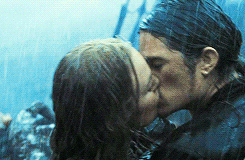
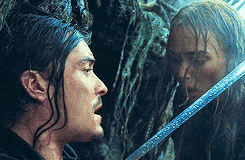
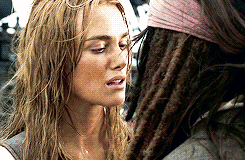

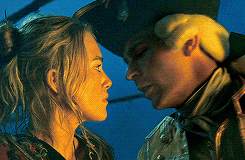

“One of the most interesting things about Elizabeth Turner was her Kiss of Death. Throughout the trilogy, all of the men she locked lips with has died - including Sao Feng in At World’s End, and (if you want to be petty about it) her father, Weatherby Swann. Usually they would die moments after kissing her for the first time. This excludes Will Turner who has kissed her several times before and beat the odds every time. However, even he succumbed to her kiss and died as well minutes after the two were hastily married by Barbossa. This is most likely a just coincidence and not something that was intentional, but years later it’s still fun to point out to friends and watch a dawn of realization hit their face when they realize that Pirate Queen Elizabeth may have also been the Grim Reaper.”
122K notes
·
View notes
Text
Now that I’m older, it’s occurred to me that Jack Sparrow really does play the role of the mentor figure in Curse of the Black Pearl. He’s definitely a very cleverly subversive take on the trope, but he is a take on it nonetheless; The older figure who teaches our young, hotshot hero how to act and passes on wisdom. “I knew your father.” An experienced member of a forbidden group that our protagonist learns to accept he is a part of. Acts as a call to action, and isn’t introduced until past the first few scenes of the film.
By contrast, Elizabeth and Will are established in the movie’s first scene, which further strengthens the actually hot take that they’re the main protagonists of the film and the trilogy as a whole, not Jack. Jack is just less recognizable as a mentor because he breaks a lot of the rules (more guidelines really) of the trope, and is treated as more than just a tool for our main character’s growth; He’s someone with his own life and wants and stake in this, too.
Jack Sparrow is ultimately the Gandalf, the Obi-Wan of Pirates of the Caribbean. And that leads me to my argument that PotC is the Star Wars of its generation, with its own Empire Strikes Back and everything. It’s got a lot of the same tropes and structure, but it’s mixed around and dressed up in such a unique way that most people fail to realize this at first glance.
Take for example, the dynamic of Davy Jones and Cutler Beckett... This is just Vader and Tarkin in A New Hope; A more iconic, supernatural threat, physically imposing, who is nevertheless subservient to Just Some Guy who is British and represents the Machine that strips the world of its magic and wonder. Vader and Jones are more romantic, they’ve got sad backstories and are humanized to the audience; But Tarkin and Beckett are banal and simple, just ruthless men who don’t care, like in real life.
But while Tarkin dies in the first film to make way for Vader taking the spotlight, as well as his similarly theatrical Emperor, the creators of PotC clearly wanted to explore the dynamic of a supernatural force straining against his imperial collar, and the tension of knowing he is contributing to the decline of his own kind. They took Vader and Tarkin’s relationship and made it front and center, happening at the end of the trilogy and not at its beginning. And it is Beckett and the imperial machine that is emphasized as the true evil, whereas in Star Wars, the Empire takes orders from Palpatine and his Dark Side shenanigans, who are framed as the foundation for the conflict.
The crew reinvented Star Wars for a new audience, rather than just... pulling off of the brand and imagery of Star Wars, or copying it word-for-word. They understood the core foundation of the story and the earnest creativity that comes into making something both familiar yet inarguably new, which subverts the stories that came before it in a meaningful manner.
#pirates of the caribbean#potc#jack sparrow#davy jones#cutler beckett#curse of the black pearl#cotbp#star wars#meta#analysis
533 notes
·
View notes
Text
maybe it's just the Radical Rediker talking, but there's something pointed in the way that, say, popular pirate media like Pirates of the Caribbean dilutes the pirate's freedom to "bring me that horizon" as opposed to, say, "plenty and satiety, pleasure and ease, liberty and power" (Bartholomew Roberts).
broadly speaking, most pirates chose the life in order to escape and revenge the hard labour, corporal punishment, overworking, and unequal pay of merchant/navy/privateer ships; or the privations of their sudden unemployment once a war was over, ignored as soon as their ability to die for the state was unneeded. yes, many were thugs, but, consciously political or not, they were responding to a particular, material reality.
the pirate's desired freedom was from the effects of exploitative modes of statehood and capital production. but popular media usually shifts this into a general desire for freedom: freedom to roam, freedom to love (usually merely a cross-class white, heterosexual union), or freedom from the personal pressures of social norms. it's a vague, ahistorical, post-Enlightenment, libertarian ideal rather than a response to a real social and economic situation.
to be clear, this only really applies to specifically the late golden age of piracy, in the first quarter of the 18th century. earlier generations of pirates/buccaneers often displayed nationalist/religious motives, and were lauded, tolerated, or even encouraged by the French and English states for aiding their fights against the Spanish and Portuguese. only the last gasp of age of sail pirates had a truly anti-national energy, and both figured themselves, and were figured by the imperial powers, as the enemies of all nations.
but if we are to valourise the late golden age pirate, at his best, his ideals were for true democracy, and the abolition of nation, hierarchy, and labour exploitation; not "the horizon". he was striking out in response to specific political, social, and economic oppressions, rather than a general individual restlessness, and that reality - and its similarities to our own - are important.
I dunno, I just... have a lot of thoughts about the defanging of piracy in modern media. obviously there were a lot of things bad about them, too, and the level of egalitarianism varied between individual people and ships. but again, if we're going to be valourising them anyway... there were idealists. and they weren't subtle about they wanted.
"I shan't own myself guilty of any murder", said William Fly in 1726. "Our captain and his mate used us barbarously. We poor men can't have justice done us. There is nothing said to our commanders, let them never so much abuse us, and use us like dogs. But the poor sailors --"
#pirates#history#pirate history#Togas does meta#Rediker is Marcus Rediker and I've only just started finally reading some of his work properly but god it's good#also if you've watched Black Sails I'd love to know how much of this energy is in there#it's a bit too ~gritty for my tastes but I get the impression it's also a bit vague about freedom over material historical politics#but i could be wrong!#obviously PotC has an ingrained anti-EIC vibe but even then it's more about ''they're enclosing the sea against us wild rovers'' than#''company captains beat us half to death just for the wealth we facilitate to be funnelled to the top while us sailors are left to rot''#and christ knows it's not interested in historical realities XD
139 notes
·
View notes
Photo
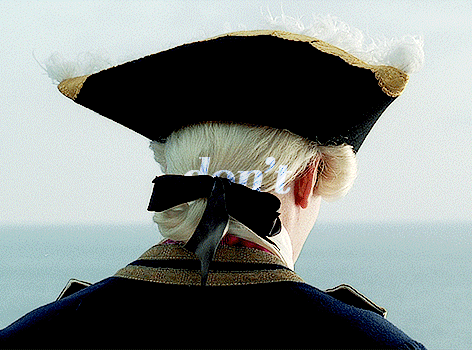

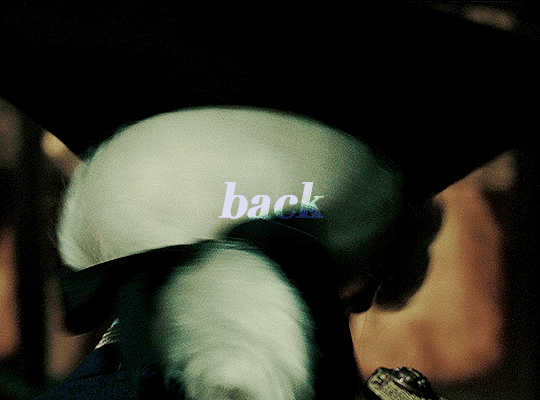
close enough that light we can see my doubt betrays the better of me ♫♪
#pirates of the caribbean#potcedit#disneyedit#filmedit#james norrington#*userbolt#if you look closely you can see me fighting for my life trying to get the colors from these movies to match#can someone else write the meta for this. i'm so sad#gif: potc#norribeth
476 notes
·
View notes
Text
Reblogging again for Eldritch Horror Mermaids.
The one thing I can’t ever stop thinking about is how horrifying the Merfolk would be if the young Jack Sparrow books were adapted into a live action series. Like they’d be straight up NIGHTMARE FUEL.
This is how they look in one’s peripheral vision. The manga version is mostly accurate to how they’re described in the books.

Now I don’t have episodes for my fantasy Disney+ series fleshed out but let me tell y’all that I really want The Siren Song episode(s) to have a horror vibe. Like the music is all eerie and everything feels tense as crazy things are happening to the ship and everyone on it, and the siren song itself is super creepy and ethereal.
And then later on, Jack has Arabella in his arms underwater and he stares at the beautiful face of a mermaid in front of him. In the book she lets out a bubbly hiss and Jack startles, but on screen we’d be hit with a jumpscare and Jack screams underwater (which would make a great trailer shot btw.)
It wouldn’t be that scary because it’s Disney but The Siren Song episode would terrify an entire generation of kids 😂
20 notes
·
View notes
Note
What do you think of “violence” as a lens for examining the movie? I see someone mentioned it in the notes of a recent post contrasting Ben and Ian’s approaches to getting fingerprints, and I remember observing to one of my friends that it struck me as an action movie where the heroes are being shot *at* but never shoot anyone, they outwit, hide, and flee. Even at the end, under Trinity Church when they outnumber Ian’s team, the heroes don’t attempt to rush the surviving henchman and get his gun, their response is still to *outwit* Ian again.

Hey @kaiyves-backup,
Great question!
I believe the commentary in question is by @tentacledwizard.

Parallel Action
I adore the heist sequence so much. It's conveying a lot of information about both teams visually while ratcheting up the tension the whole time. This technique of cutting back and forth between two sequences of related activities is called 'parallel action', and it is used to fantastic effect in this part of the movie.
I mean, pretty much every part of National Treasure is one of my favorite parts of National Treasure, but the heist sequence just sings, and this crosscutting is a big reason why.
Good vs Evil
The trope of the heroes winning through wits instead of violence is a longstanding one. You could probably trace it back to The Odyssey if you were so inclined? It plays on some base cultural assumptions we have about good = clever, intelligent, peaceful while bad = violent, brutish, dumb. Obviously the particulars of those associations change over time, but broadly they stand.
And National Treasure is very clear about situating each side with the "good vs evil" narrative. While Ben is prepping UV light powder, Ian and co are amassing grenades and blocks of C4.


Ian's crew tases a guard to gain fingerprint access, while Ben artfully steals Abigail's fingerprints with no harm done other than some awkward flirting and potentially weird implication for their relationship later but that's not what we're dealing with atm.


The film takes every opportunity to show us the difference between these two approaches, and I think there are a few reasons why, both in general and to serve this story in particular.
First of all, both teams are doing a "bad" thing. They are both trying to steal something that we, the American public consciousness, hold sacred. To differentiate them and make sure we know who is doing it for the right reasons and for the wrong reasons, the film gives them two very different approaches. It's clear at every step who to root for.
The parallel action is also creating dramatic irony. We know that Ian is coming, and that he's heavily armed, but Ben doesn't until it's nearly too late. That creates some delicious tension, because the editing keeps reminding us what Ben and Riley don't know: this sequence is actually a race not just against the clock, but against armed mercenaries Yikes!
It also sets up Ian as a formidable antagonist. He's just as capable as Ben, but much more dangerous. He's able to match Ben and Riley's heist literally beat for beat on screen, while causing much more harm to people and property. This underscores that he will not hesitate to harm Ben, the Declaration, or anyone else who crosses his path on the treasure hunt (as an unfortunate Dr. Chase is about to learn).
Clever Heroes
One thing I want to focus on especially is the way this movie actually subverts this trope a teeny bit. Usually, the trope is that the good guys are just as capable of violence as the bad guys, but choose not to use it. They elect to outwit because it's more 'gentlemanly.' Off the top of my head I'm thinking of:
The Princess Bride. Both sides feature skilled fighters and Wesley and Inigo can and have killed a man like slicing butter, but they elect to use their wits and civility whenever possible. By contrast, Prince Humperdink and the Six-Fingered Man will use any violent means necessary to get what they want.
White Collar. Slightly random, I know, but I'm watching this right now, and the show makes it clear from the outset that Neal Caffrey is an expert marksman and highly competent with guns but he chooses not to use them because he's a classier (and therefore more likable) kind of criminal.
James Bond?? Honestly I haven't see one of these in a while but I feel like 007 isn't just mowing people down all the time. He's playing them. Outsmarting them. Only getting his hands dirty when he has to. Because he's, again, smarter/suaver/more 'civilized' and likable than his antagonistic counterparts.
The key here is that these guys all have the same violence as their opponents as an option in their toolbelts and make a moral choice not to use it.
Ben doesn't have that option.
Weak heroes
He could not, on his best day, go toe-to-toe with Ian or any one of the henchmen, let alone a group of them together. His only choice is to outwit them.
Throughout the course of the movie Ben throws one (1) punch and it hurts enough that he has to stop and shake his hand out.

And he only gets that punch off in the first place because Powell isn't expecting it.
He's a researcher. Yes he's fit enough to run around and scuba dive but if he had any kind of hand to hand combat training it would have been ~20 years ago when he was in the ROTC program.
This puts him in a sub-category/related trope: the scrawny nerd who outwits the much more physically powerful enemy. Think Mulan using the weights to help her climb the pole or a pre-serum Steve Rogers pulling the pin out of the flag poll.


And Ben is the most athletic of the bunch by far. Abigail seems like a person who takes good care of herself, but probably in a lowfat-yogurt-and-pilates way not in a can-fuck-you-up-with-martial-arts kind of way. And Riley? ...Riley does not strike me as someone who is especially strong or fit. Screen time, junk food, late nights online. Patrick is in his 60s and eats pizza alone on Friday/Saturday nights.
So while they maybe could have overpowered Ian all together, it would be a big risk, and probably none of their first instincts. Team Treasure is entirely composed of neurodivergent nerds--one imagines they all learned pretty early in their childhoods that they couldn't overpower their bullies, but they could outsmart them.
And so when their lives are on the line, they turn to the self-preservation strategy that's gotten them this far: their wits.
Conclusion
Wow, I did not expect this answer to get so deep!
This turned into an interesting look at both the creative choices in the movie and the characters.
Thanks so much for your question! Feel free to send another any time.
#national treasure#the national treasure gazette#national treasure meta#film studies#ben gates#abigail chase#riley poole#ian howe#thanks also for buying me more time to finish the POTC post :)
30 notes
·
View notes
Text
rewatching pirates of the caribbean and looking at the Jack Sparrow family tree made me realize a very funny thing.
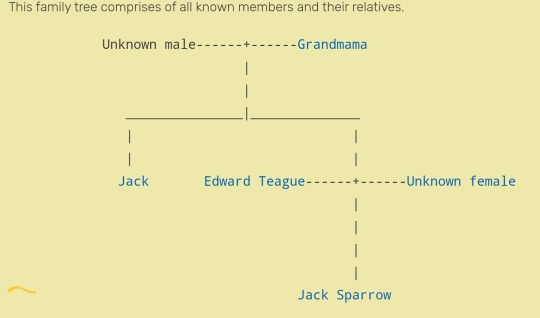
Edward Teague is Jacks father.
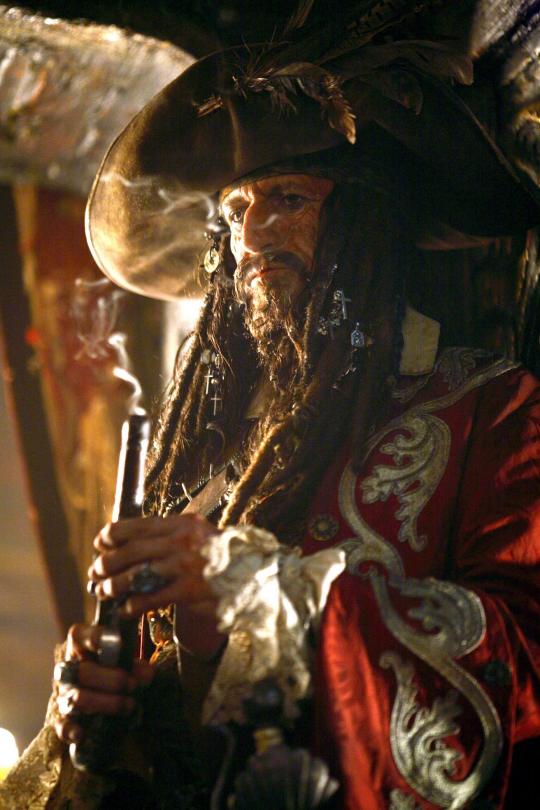
He is losely based on Edward Teach.
(I know there's a Blackbeard in Pirates of the Caribbean, who is called Edward Teach, but let's ignore that for a second. Blackbeard is a name losely used for any captain who has the vibe honestly.)
If Edward Teague aka Jack Sparrows Dad was Blackbeard....
he-

would be Jacks Dad.
And Stede would be his Mom.
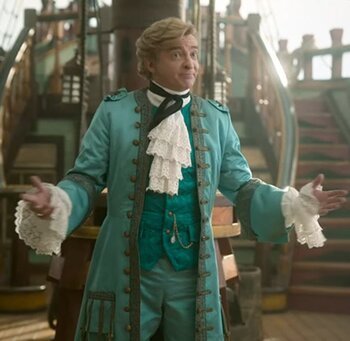
Jack Sparrow has gay parents.
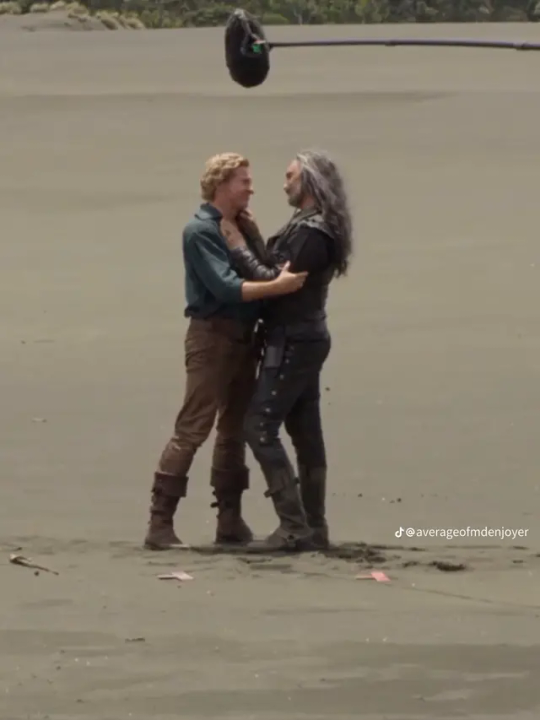
Let me live that fantasy please
#I know that's stupid#I just want that to be true#let me live my little mindfuckery#I want Jack Sparrow as Ed and Stede's son!#pirates of the caribbean#jack sparrow#our flag means death#ofmd#ofmd meta#potc#edward teach#edward teague#stede bonnet
78 notes
·
View notes
Text
Will Turner Is Not Smart: At World’s End Edition
The final installment of this series, because the subsequent films do not count!
Previous discussion of Will’s unhinged decision making in Curse of the Black Pearl is here, and a record of his clownery in Dead Man’s Chest is here.
Will Turner in At World's End is just… wow. He is trying so hard to be smart, and failing spectacularly at it. I was going to say that he should have figured out by now that Elizabeth is the brains of their relationship, but honestly, Elizabeth makes some very poor decisions in this film as well. Let’s get into it, shall we?
Prologue: Believing the Pearl can beat the Dutchman
As with Dead Man’s Chest, the set-up for Will’s worst decisions in At World’s End originates in the previous film. In this case, it’s his bizarre conviction that he needs the Black Pearl in order to rescue his father, which he appears to have decided based solely on the fact that the Pearl is fast enough to outrun the Dutchman.
As stated previously, this makes no sense. The Pearl managing to outrun the Dutchman does not mean that the Pearl would win in a fight, even without taking into account that the Dutchman is a ghost ship captained by a supernatural entity who can only be killed in one very specific way. If Will had managed to take the Pearl and used it to catch up with the Dutchman without first obtaining Davy Jones’s heart, Jones would have just killed him.
Blunder 1: Not talking to his fiancee
There’s a time skip between the second and third films. We’re not sure exactly how much time has passed, or how our main characters manage to get to Singapore, but based on the speed of travel at the time, I think it’s safe to say that between three and six months have passed since the end of the second film.
During this time, Elizabeth is distant with Will, because she is hiding the fact that she doomed Jack to the kraken so that everyone else could escape. Will, meanwhile, is distant with Elizabeth because he saw her kissing Jack during said treachery, and therefore decided that the reason Elizabeth is being so distant must be because she actually loved Jack, and she’s in mourning until they can get him back.
Three to six months is a very long time to go without meaningfully speaking to your fiancee. Elizabeth shares the blame on this one, but it’s unfathomable to me that they went this long without having a conversation about this. If these two morons had sat down and discussed their feelings with each other for fifteen minutes, then Will would never have doubted Elizabeth’s love for him, and Elizabeth could have sensibly pointed out to Will that his plan to save his father didn’t make a lick of sense.
Instead, the two of them moped all the way to Singapore, and everyone suffered. How Barbossa tolerated this, I have no idea.
Blunder 2: Bargaining with Sao Feng
It’s cute that Will thinks he can plot and backstab with people who’ve been pirating for decades and still come out on top. While there are parts of Will and Sao Feng’s interactions that are open to interpretation, I get the sense that Will has betrayed their mission to Sao Feng before Barbossa and Elizabeth even arrive at the bathhouse.
Sao Feng makes this comment:
It seems the only way a pirate can turn a profit anymore… is by betraying other pirates.
He then glances meaningfully at Will, and the expression is more conspiratorial than condemning. I can’t decide if this means that Will turned himself in—I can’t think of any good reason why he would, since they do genuinely need the navigational charts to rescue Jack and the Pearl, but Will does plenty of things without good reason, so I’m not ruling it out—or if Will was genuinely captured during his attempted theft and made what efforts he could to salvage the situation.
Regardless, it doesn’t sound like the first time they’ve discussed the topic when they are later taking cover from the East India Trading Company’s assault:
Sao Feng: It's an odd coincidence, isn't it? The East India Trading Company finds me the day you show up in Singapore. Will: It is coincidence only. If you want to make a deal with Beckett, you need what I offer. Sao Feng: You cross Barbossa. You are willing to cross Jack Sparrow. Why should I expect any better? Will: I need the Black Pearl to free my father. You're helping me to get it.
Sao Feng asks a good question here, and Will lays out his motivations quite plainly. What he fails to do is consider the same question in the reverse: if Sao Feng is willing to cross Jack Sparrow and Barbossa to make a deal with Beckett, then why would he not betray Will, too?
He has no reason not to, and so that’s exactly what he does. And Will has the gall to be surprised.
The result is that Will ends up locked in the Pearl’s brig while Elizabeth turns herself over to Sao Feng in exchange for freedom for the Pearl and her crew.
Clever by accident: Leading Beckett to Shipwreck
Will escapes the Pearl’s brig and leaves a trail of corpses tied to barrels in the Pearl’s wake so as to lead Beckett to Shipwreck Cove. It isn’t clear at this point exactly what his plan is, beyond potentially bargaining with Beckett for his father’s freedom and Elizabeth’s safety.
This ends up being sort of clever, but mostly due to the fact that Will is now in a position for Jack to use him as a chess piece in his quest to draw in Beckett, the Dutchman, and Jones’s heart, thus allowing him to kill Jones and simultaneously clear his debt and achieve immortality. As Beckett later comments, Jack is the grand architect of the coming conflict, and Will is merely a tool to achieving his ends. Thus, accidentally clever.
Clever on purpose: Nudging Calypso in the right direction
It’s not clear from what we see in the film whether Calypso was aware that Jones was the one who told the Brethren Court how to bind her.
The fond way she greeted Davy Jones when he visited her in the Pearl’s brig makes me think she didn’t. She probably suspected it, but didn’t want to believe it. I imagine very few in the world would have possessed the knowledge of how to bind her, and that information may well have been something Calypso told Jones as a gift of sorts, to demonstrate how much she loved and trusted him. It’s easy to see how she would have preferred to focus her anger on the Brethren Court, rather than acknowledge that the man she loved could have betrayed her like that.
She was certainly gearing up to kill the Brethren Court upon being released from her mortal bonds, as evidenced both by her conversation with Jones in the brig, and a deleted scene with Barbossa where she encourages him to turn the Pearl’s cannons on the Brethren Court and force them to release her. It was actually very clever of Will to remind/inform Calypso of just who was responsible for her imprisonment in the first place.
Good job, Will. You managed to do something clever.
Blunder 3: Stabbing Davy Jones
Will, Will, Will… why? Why???
Did you forget he doesn’t have a heart? Y’know, the titular point of the last movie? What did you think was gonna happen when you stabbed him, hmm?
Your surprise about this is what got you stabbed, and landed you in charge of the Dutchman instead of Jack. I get that you were trying to draw him away from Elizabeth, but still. You’re a competent swordsman. You could have saved Elizabeth without getting stabbed if only you hadn’t inexplicably forgotten that Jones can only be killed by stabbing his heart, which is very much not in his chest.
Oh, well. At least, with Will's heart in Elizabeth’s hands, she can be assured that her fool of a husband can no longer get himself killed from his own poor decision-making.
21 notes
·
View notes
Text
hello one billion new followers i gained while i was sick????
#i have to assume that this is bc of the potc meta post. uh. welcome? hope you enjoy whatever it is i do here now#you should go follow the op (molinaesque) who actually MADE the great gifset (and has made many more!!)#and also my beloved co-conspirator on that post theimpossiblescheme
16 notes
·
View notes
Text


Chevalle's Jolly Roger is identical to the flag attributed to the historical pirate Stede Bonnet. Capitaine Chevalle is the pirate lord of the Mediterranean Sea from the “Pirates of the Caribbean” Franchise. ===
My thoughts always went to Captaine Chevalle, when I heard “Gentleman Pirate”. Now I know there was a connection to Bonnet indeed.
🏴☠️
#Our Flag Means Death#ofmd#ofmd meta#stede bonnet#pirates of the carribean#captaine chevalle#potc#also he looks like captain hook#thats quiet nice
8 notes
·
View notes
Photo
NICE
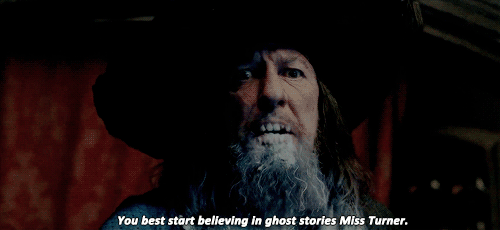


257K notes
·
View notes
Text
I’d argue that, unintentionally or otherwise, On Stranger Tides is a fairly proletarian film. You can basically boil down OST to the story of a bunch of men being forced to work under the worst boss(es) ever; The enslaved sailors of Blackbeard’s crew are lied to about the premises and nature of their work, and as I said, are enslaved with no pay. They’re forced to do increasingly ludicrous and dangerous tasks for their master Blackbeard, who has the gall to call them cowards when they attempt to flee from the mermaids... Even though Blackbeard himself, conspicuously, is not in the water participating in the hunt with them.
Jack Sparrow may as well be a stand-in for unions, someone who’s looking out for his fellow worker, doing his damnedest to keep as many people alive as possible and forsaking his personal goals for the wellness of others. He might grouse about having to rescue everyone at Whitecap Bay, but we know he’d do it again, just as he jumps down the waterfall to find the chalices so nobody else has to, and sacrifices his shot for immortality to save Angelica (whose devotion to her father has him callously attempt to take her life for his own).
He’s the guy inciting Blackbeard’s crew to mutiny against him, and tries to take the fall for the Cook, knowing he is needed but his fellow slave isn’t (It fails, but the effort is what counts). Blackbeard’s zombies are the natural extreme of unquestioning servitude to their master, and there would’ve been a scene where the Cook is revealed to have become a zombie himself, which plays into the dehumanization of everyone’s labor.
Blackbeard’s crew only stick around and work for him as long as they need to, as much as they need to; But as soon as their boss is struck down, they have zero qualms with abandoning him to his fate and siding with their liberator Barbossa, for whom they end on an infinitely more happy, hope-filled note. Barbossa is a fellow pirate who works down and dirty on their level (in the previous film, he waxes poetic about pirates who tame the sea through the sweat of their own brow, and proves he means it), and has an actual connection to his crew.
Likewise, you’ve got the navy, working for Barbossa, who is working for King George II. There’s a scene where they realize they’re all sailing towards certain doom at Whitecap Bay, but Barbossa pulls everyone back into line by waxing poetic about their national loyalty and ideology, chanting “Are we not king’s men?” This works, and what do these king’s men get for sticking to their posts?
Most are unceremoniously massacred by the mermaids. Barbossa, who is revealed to only be in this for himself and has zero concern for the crown, doesn’t even bat an eye. His abandonment of his crew is first and foremost out of apathy, and not resignation to his own powerlessness against the mermaids, and everyone with him knows it.
The film ends with everyone working for King George II slaughtered, with the last and most notable death being Groves; He makes a bold yet impractical stance for his majesty, and is casually killed by the Spanish for it. The redcoats are roused to sacrifice themselves for leaders who don’t care and are lounging on food and drink (King George II and Barbossa), and only ever suffer for their ideological loyalty. Similarly, Blackbeard’s zombies stay loyal to him even when he is struck down, but all they get for their efforts is being crushed under a giant pillar.
As I said, Barbossa DOES play the role of an uncaring boss to the redcoats, but he is beholden to another uncaring boss of his own, King George II, whom the movie gives a fairly unflattering, pampered portrayal of. Barbossa may enjoy the finer things in life too, but he’s still a hardworking man who recognized the callousness of the crown, and only used it for his own agenda, rather than allow the other way around to occur.
Likewise, you have him and Gibbs, who is a former navy sailor who left to become a pirate. Once more, he is dragged into servitude, but he makes sure to negotiate his own survival by recognizing the value of what he can provide, and holding onto that; This mindfulness keeps him alive, and allows Gibbs to escape to safety before the final act, and even retrieve the Black Pearl and other ships for his luck.
OST argues this; Only work for your employer for as much as you need to, but once you have what you want, get out ASAP. Barbossa knows the crown doesn’t care for the expendable redcoats, so he prioritizes his own agenda, fulfills it, and leaves on a triumphant ending. Blackbeard’s crew do what they need to do to survive, then skedaddle. Anyone else who bears through the work for the sake of it, such as Angelica or the zombies or redcoats, are only punished for their blind trust.
Blind ideological faith towards your boss will get you nowhere, so make sure to know the value of what you have to offer, and leverage it as much as possible. Which, given PotC’s emphasis on freedom and defying capitalistic authority... There’s a good argument to be made that this pro-Union film is intentional about its message.
#pirates of the caribbean#on stranger tides#potc#meta#jack sparrow#blackbeard#hector barbossa#joshamee gibbs
44 notes
·
View notes